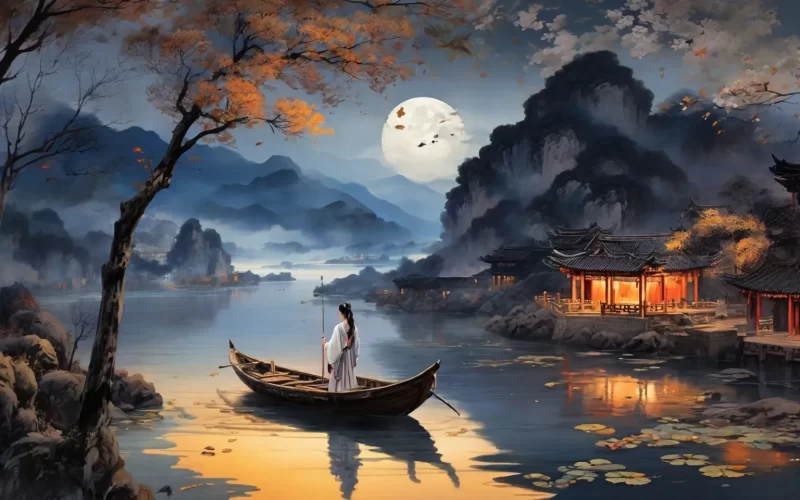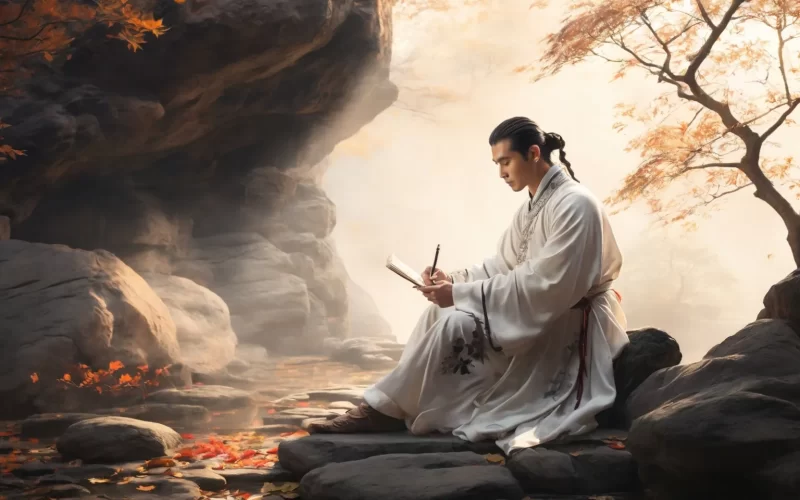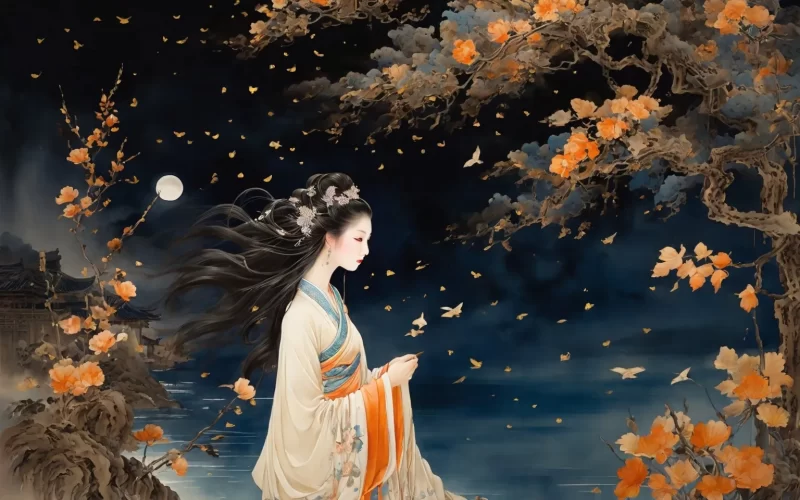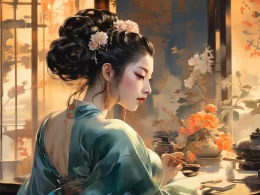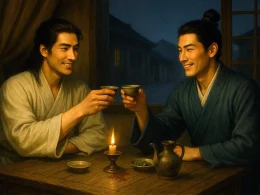Red leaves are fluttering down the twilight Past this arbour where I take my wine; Cloud-rifts are blowing toward Great Flower Mountain, And a shower is crossing the Middle Ridge. I can see trees colouring a distant wall. I can hear the river seeking the sea, As I the Imperial City tomorrow - But I dream of woodsmen and fishermen.
Original Poem
「秋日赴阙题潼关驿楼」
许浑
红叶晚萧萧,长亭酒一瓢。
残云归太华,疏雨过中条。
树色随山迥,河声入海遥。
帝乡明日到,犹自梦渔樵。
Interpretation
Composed during Xu Hun's journey to the capital for imperial examinations, this poem captures Tong Pass—a strategic gateway to Chang'an renowned for its majestic terrain. Witnessing autumn scenery from the watchtower, the poet blends awe for nature's grandeur with reflections on official aspirations and lingering attachment to reclusive life.
First Couplet: "红叶晚萧萧,长亭酒一瓢。"
Hóng yè wǎn xiāo xiāo, cháng tíng jiǔ yī piáo.
Crimson leaves whisper in twilight,
At roadside pavilion, one gourd of wine.
Autumn's melancholy permeates the opening—falling leaves and solitary drinking establishing the traveler's pensive mood.
Second Couplet: "残云归太华,疏雨过中条。"
Cán yún guī tài huá, shū yǔ guò zhōng tiáo.
Lingering clouds drift to Hua's peak,
Scattered rain sweeps Zhongtiao's streak.
Expanding the vista, the couplet frames north-south mountain symmetry (Hua and Zhongtiao) with dynamic weather patterns mirroring the poet's inner fluctuations.
Third Couplet: "树色随山迥,河声入海遥。"
Shù sè suí shān jiǒng, hé shēng rù hǎi yáo.
Tree hues fade with winding ridges,
Yellow River's roar hints oceanic distances.
The poem's climactic couplet achieves sublime grandeur—visual depth ("winding ridges") merging with auditory vastness ("oceanic distances"), conveying Tong Pass' magnificent topography through sensory immersion.
Fourth Couplet: "帝乡明日到,犹自梦渔樵。"
Dì xiāng míng rì dào, yóu zì mèng yú qiáo.
Tomorrow reaches the capital,
Yet I dream still of woodcutters' call.
The unexpected conclusion subverts examination journey expectations—on the capital's threshold, the poet's subconscious clings to idyllic simplicity, revealing his authentic spiritual yearning.
Holistic Appreciation
The poem transforms a Tong Pass stopover into meditative art. Initial couplets paint autumnal scenery (whispering leaves, mountain rains) with delicate brushstrokes, while the central vision of "tree hues" and "river's roar" explodes into majestic spatial-temporal dimensions. The finale's dreamt woodcutters—appearing precisely when official success nears—deliver profound psychological insight: beneath ambition's surface flows an undimmed pastoral longing. Xu Hun's mastery lies in making landscape mirror soulscape.
Artistic Merits
- Structural precision: Rigorous parallel couplets (clouds/rain, trees/river) balance natural observation with emotional resonance
- Sensory layering: Visual ("tree hues"), auditory ("river's roar"), and subconscious ("dream") dimensions intertwine
- Philosophical reversal: The examination candidate's "woodcutters' dream" upends conventional ambition narratives
Insights
This Tang-era masterpiece articulates eternal human tension between worldly pursuit and spiritual homecoming. Xu Hun's paradoxical "capital-bound yet dreaming of woods" reminds modern readers: meaningful journeys require checking our internal compass—sometimes destinations reveal themselves as detours, while true north points back to simpler callings. The poem's enduring power lies in its quiet protest against linear success metrics, honoring instead life's cyclical call between mountains and metropolises.
About the poet
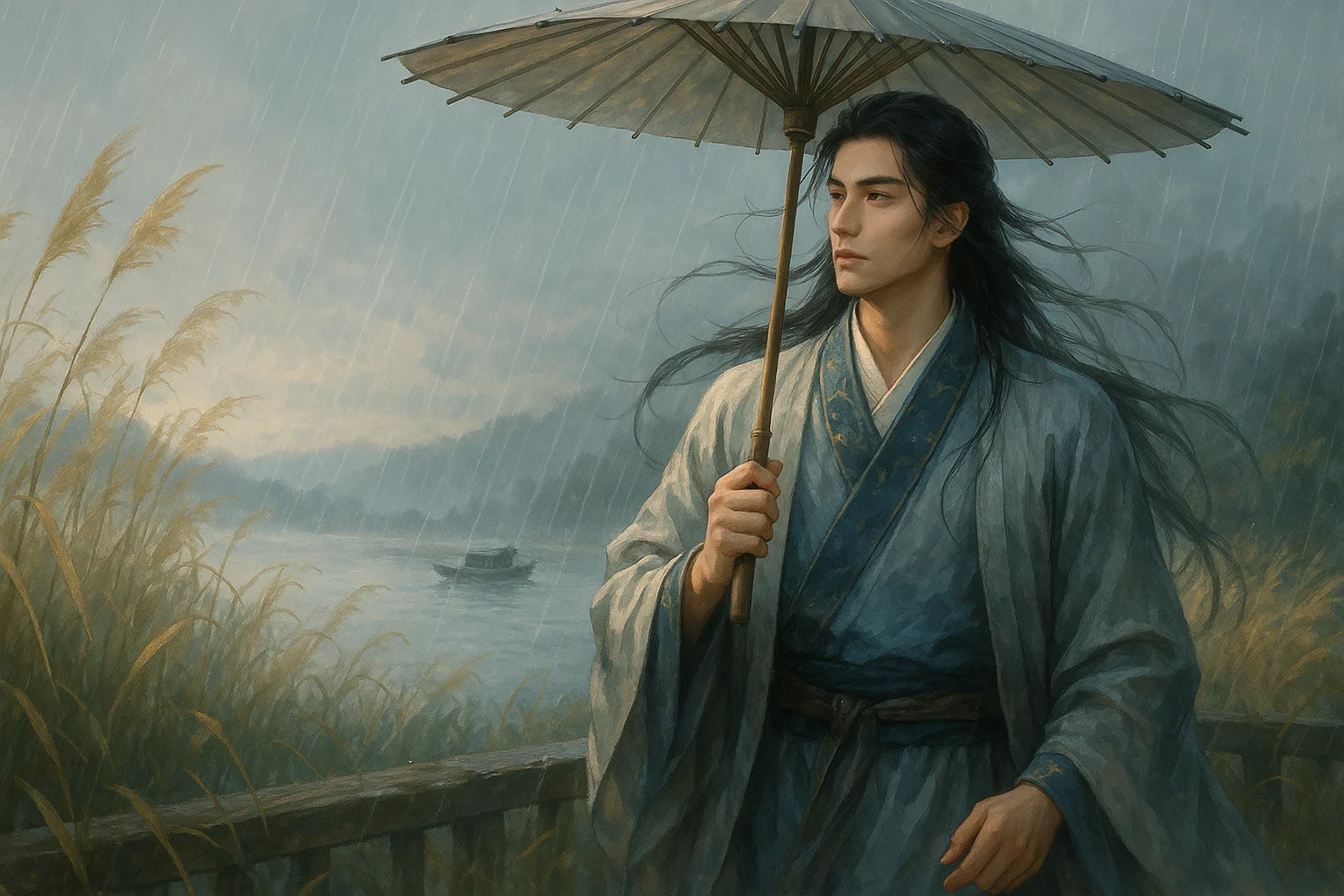
Xu Hun (许浑), c. 791 - 858 AD, was a Tang Dynasty poet, a native of Danyang, Jiangsu Province. He was one of the most influential poets of the Late Tang Dynasty. His poems are characterized by nostalgia for ancient times and idyllic poems, in which he describes the scenery of water and rain.






